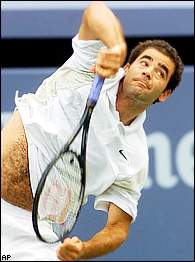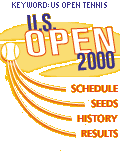| | By Greg Garber
ESPN.com
NEW YORK -- On Court 4 at the National Tennis Center, on this impossibly brilliant day, Pete Sampras smiles. Several hundred yards from the crucible of the Arthur Ashe Stadium court, where Nicolas Kiefer and Magnus Norman are trading heavy forehands, Sampras appears relaxed.
|  | | Pete Sampras is clearly more relaxed this year as he guns for another U.S. Open crown. |
Wearing a faded white Nike T-shirt and a pair of green sweat shorts, the 13-time Grand Slam singles champion chit-chats with coach Paul Annacone. He is practicing Tuesday afternoon against a 16-year-old praying mantis, an awed Croatian junior doing his best to replicate the big, big serve of Richard Krajicek, who happens to be Sampras' quarterfinal opponent Wednesday at the U.S. Open.
After 45 minutes, just as the sweat starts to appear around Sampras' neck, he breaks off the session and moves to sign autographs. Then, he crosses the court and signs for the kids on the other side. He smiles again and walks briskly through the crowd to the players' lounge.
Is this Pete Sampras, the dour, focused athlete who has won more Grand Slam singles titles than any other man? Or, at 29 and preparing for a wedding later this year, is this really someone else?
"You said it, I didn't," Annacone said a few minutes later in the sprawling lounge. "But, yes, he has changed. You change as you get older, and Pete is just like everybody else.
"He's never been comfortable as a celebrity. He's enjoying his life more than he used to -- and people see him enjoying it more. They're seeing a more human side."
This, of course, is news to the rest of the men's tennis world. Sampras, already arguably the best male player ever, has had a reputation for ruthless drive and a gnarly bedside manner. Winning Wimbledon for the seventh time in eight years and breaking Roy Emerson's Slam record has taken the pressure off in a big way.
For six years, from 1993-98, Sampras was the No. 1-ranked player in the world. He hungered to break Jimmy Connors' record of five consecutive years, and so he did. Now, Grand Slams are the only important tennis destination.
While the younger players like Norman, Gustavo Kuerten and Lleyton Hewitt are all over the place -- all younger than 25, they have won an ATP Tour-leading four tournaments -- Sampras has won only two tournaments this year, Wimbledon and the Ericsson Open.
"No. 1 today, to me, isn't what it used to be," Sampras said. "I'd like to get back up there, but I'm not willing to play all these extra tournaments to do it. To be No. 1 for a long time, you have to give up things. You don't have a lot of time for any outside stuff. It just takes a lot out of you."
This is why Sampras is seeded No. 4 at the U.S. Open, the lowest since 1991.
Quality, however, always rises to the top. With Tuesday's loss by Norman, Sampras is the highest remaining seed in the field because No. 1 Andre Agassi and No. 2 Gustavo Kuerten already had departed.
The toughest opponent left in the draw is probably Krajicek, who holds an unheard of 6-3 career advantage over Sampras. It was Krajicek, who blew the symmetry of Sampras' still-historic run at Wimbledon, defeating him in the 1996 Wimbledon quarterfinals and becoming the eventual champion.
"Obviously, Richard's got a huge serve and backs it up with good volleys. He's a tough guy to pass," Sampras said. "It's going to come down to the return of serve, who puts more pressure on the second serve. It's not an easy match."
Krajicek, at 6-foot-5, possesses an enormous wingspan and is one of the Tour's hardest servers. But at least part of the secret to his success is his mental approach.
"I keep on attacking him," Krajicek said. "Because once you let him attack you and let him decide how he's going to come in and decide how the game's going to be played, then you're in big trouble. I keep coming in also on the second serve if he stays back, then I force him to basically play serve-and-volley all the time.
"That's always my game actually against everybody, but also against Pete. In that sense, I don't show him the respect that he's so good."
Everywhere else, that respect is now obligatory.
Sampras seems to sense this and has relaxed, according to those close to him. Maybe it's because he's fallen in love; he and actress Brigette Wilson will be married soon.
On the Friday before the Open began, Sampras was hitting balls with Pearl Jam guitarist Stone Gossard. Later that night, Sampras was in the audience at Jones Beach when Pearl Jam rocked Long Island. He recently revealed that he has a disease known as Thalassemia, which causes iron-low blood. It's all part of the more emotionally accessible Sampras.
We saw this as never before at Wimbledon.
Sampras' parents, Sam and Georgia, had last seen their son play in a Grand Slam at the 1992 U.S. Open, a match he lost to Stefan Edberg. Every time Sampras reached a final after that, he would call his parents and invite them to attend. They would politely decline, saying they didn't want to get in the way. This time, Sampras told his father he wanted them at Wimbledon.
"This year I just made it a goal of mine that if I ever got to a final in a Slam that I want them there. I want them to be a part of this," Sampras said. "Wimbledon's been such a big part of my tennis, and that court is so special to me. They're obviously the reason that I'm able to play."
After losing the first set to Patrick Rafter and trailing 1-4 in the second-set tie breaker of that Wimbledon final, Sampras somehow rallied to win. The crowd roared and the enormity of his record seemed to dawn on him. Sampras bowed. He squatted. He cried. Later, he talked about his parents.
"It was important for him to have his parents at Wimbledon," Annacone said. "Unfortunately, it was a private moment that happened in front of millions of people.
"He doesn't like to make a big deal about anything. He'd prefer to just go about his business. But he's been around long enough to know he's in a fishbowl, and that you just have to make the best of it. He's dealing with it better than he used to, and he's happier because of it."
Will Sampras follow John McEnroe and Boris Becker? Will wedded bliss and fatherhood take him out of contention?
"I don't think so," Annacone said. "He plays at an extremely high level very easily. It doesn't take him long to get to that level. He has said as long as he feels like he can still win a Grand Slam, he'll keep trying."
A scary thought, indeed.
If it's true, Sampras might push the Grand Slam record close to 20.
Greg Garber is a senior writer for ESPN.com. | |
ALSO SEE
Martin guts out a victory in a late Open marathon
Washington: Summing up Sampras' Slams
|



